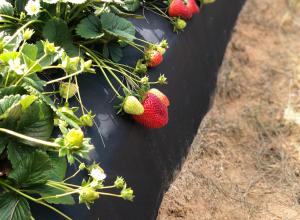Where does this show up?
Soil contamination from pesticide use found to be significantly lower on organic farms in the E.U.A study from Environmental Pollution compared pesticide residues in soil from organic and conventional farms across the European Union and found that organic farms had up to 90% fewer residues. However, researchers suggest that the existence of any residues in organic soil is a result of either highly persistent chemicals that last beyond organic transition or contamination via pesticide drift. This study took a combined approach to examine pesticide use on farms by interviewing farmers to qualitatively assess pesticide application and testing soil samples from those farms to measure... READ MORE |
Pesticide contamination of monarch host plants found across multiple landscape types in farming regionA recent study published in the journal Frontiers in Ecology and Evolution has found pesticide contamination of milkweed, the host plant of monarchs, across multiple landscape types, exposing the butterflies to a cocktail of harmful chemicals. The study detected 64 synthetic chemicals on milkweed, with agricultural and retail sites testing highest for diversity and concentrations of pesticides. Detection of synthetic chemicals on host plants in places where chemicals are not sprayed, such as refuge habitats, suggests that drift from pesticide spray events causes exposure in protected... READ MORE |
Flame weeding provides a sustainable and affordable strategy to manage weeds in organic cornIn conventional corn-soy rotations, weed control is accomplished through the use of herbicides and usually the crops are genetically modified to tolerate those herbicides. Without GMOs and synthetic herbicide tools, organic corn-soy production can accomplish weed control by tilling the soil. But to improve carbon sequestration, organic farmers and researchers have been searching for economic alternatives to tilling that are as effective at controlling weeds. A new study in the Sustainability has found a good candidate: flame weeding. This study measured the cost of weed management using a... READ MORE |
Non-chemical soil fumigants shown to be effective and affordable, especially for organic productionToxic soil fumigants that fight soil-borne diseases and ensure crop production continue to be banned to protect the health and safety of rural communities. Organic farmers and conventional farmers who can no longer use these chemical tools need effective alternatives to protect their yields. A recent study published in the journal Agronomy demonstrates that a non-chemical alternative can be effective and affordable if farmers receive a high enough price for their crops. Until 2016, Methyl Bromide had been used in California for decades as a soil fumigant to disinfest soils of devastating... READ MORE |
Organic farms can support beneficial insects when natural habitat is limited in the landscapeIn an effort to reduce the use of harmful pesticides, farmers are looking for ways to enhance natural pest control by boosting numbers of natural predators of pests on their farms. A recent study published in the journal Agriculture, Ecosystems & Environment suggests that using organic practices will support on-farm populations of natural predators, reducing reliance on sources of beneficial biodiversity like nearby patches of natural habitat. This study measured natural enemy abundance on organic and conventional citrus orchards that were either near natural habitat or natural habitat... READ MORE |








